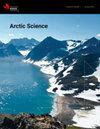某排水热岩溶湖13年流域剧烈变化及水文生态响应监测
IF 3.2
3区 地球科学
Q2 ECOLOGY
引用次数: 3
摘要
热岩溶湖的灾难性排水将部分前湖床转变为陆地环境,这对剩余的水生栖息地产生了很大程度上未知的后果。加拿大育空地区北部的老克劳平原是一个湖泊丰富的地区,最近经历了气候驱动的湖泊排水频率增加。一个显著的例子发生在2007年6月,Zelma湖(最初为12平方公里)损失了80%以上的体积。在这里,我们将遥感技术与排水后13年的原位水文和湖泊测量相结合,以1)监测水面面积和陆地覆盖变化,2)确定对水生条件的相关影响。利用无人机系统为AVIRIS-NG数据的土地覆盖分类提供训练数据,结果表明,到2017年,高柳灌木覆盖了原湖区30.8%的面积。在13年的记录中,湖水同位素来源的氘过量增加,表明水文输入增加,入侵植被内积雪积累增加。在排水后的最初几年里,湖泊条件变化很大,富营养化,但随着植被在前湖床上定居,湖泊条件变得更加稳定。这项长期研究揭示了水生生物对热岩溶湖泊排水和灌木植被增生的响应,这些响应在北极和亚北极地区正在增加。本文章由计算机程序翻译,如有差异,请以英文原文为准。
Monitoring 13 years of drastic catchment change and the hydroecological responses of a drained thermokarst lake
Catastrophic drainage of thermokarst lakes transform portions of former lakebed to terrestrial settings, which have largely unknown consequences for the remaining aquatic habitat. Old Crow Flats, northern Yukon (Canada), is a lake-rich area that has recently experienced a climate-driven increase in lake drainage frequency. A notable example occurred during June 2007 when Zelma Lake (originally 12 km2) lost over 80% of its volume. Here we integrate remote sensing techniques with in-situ hydrological and limnological measurements over 13 years following drainage to 1) monitor water surface area and terrestrial land cover change and 2) identify associated effects on aquatic conditions. An airborne drone system was used to provide training data for land cover classification of AVIRIS-NG data, which indicated that tall willow shrubs covered 30.8% of the former lake area by 2017. Lake water isotope-derived deuterium-excess increased during the 13-year record indicating that hydrological input increased with greater snowpack accumulation within encroaching vegetation. Limnological conditions were highly variable and eutrophic during the first few years following drainage but became more stable as vegetation colonized the former lakebed. This long-term study provides insight of aquatic responses to thermokarst lake drainage and shrub vegetation proliferation, which are increasing in Arctic and subarctic regions.
求助全文
通过发布文献求助,成功后即可免费获取论文全文。
去求助
来源期刊

Arctic Science
Agricultural and Biological Sciences-General Agricultural and Biological Sciences
CiteScore
5.00
自引率
12.10%
发文量
81
期刊介绍:
Arctic Science is an interdisciplinary journal that publishes original peer-reviewed research from all areas of natural science and applied science & engineering related to northern Polar Regions. The focus on basic and applied science includes the traditional knowledge and observations of the indigenous peoples of the region as well as cutting-edge developments in biological, chemical, physical and engineering science in all northern environments. Reports on interdisciplinary research are encouraged. Special issues and sections dealing with important issues in northern polar science are also considered.
 求助内容:
求助内容: 应助结果提醒方式:
应助结果提醒方式:


